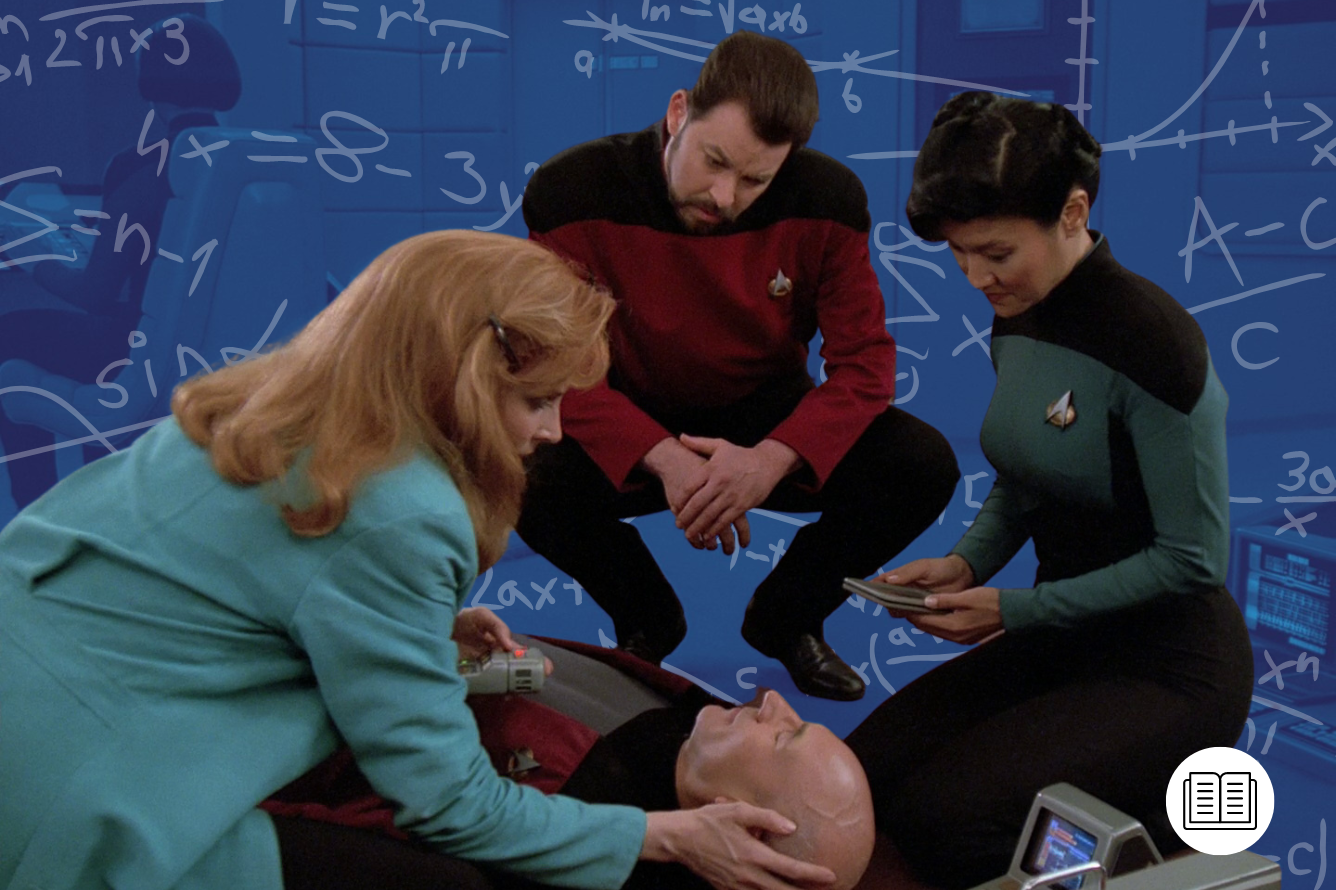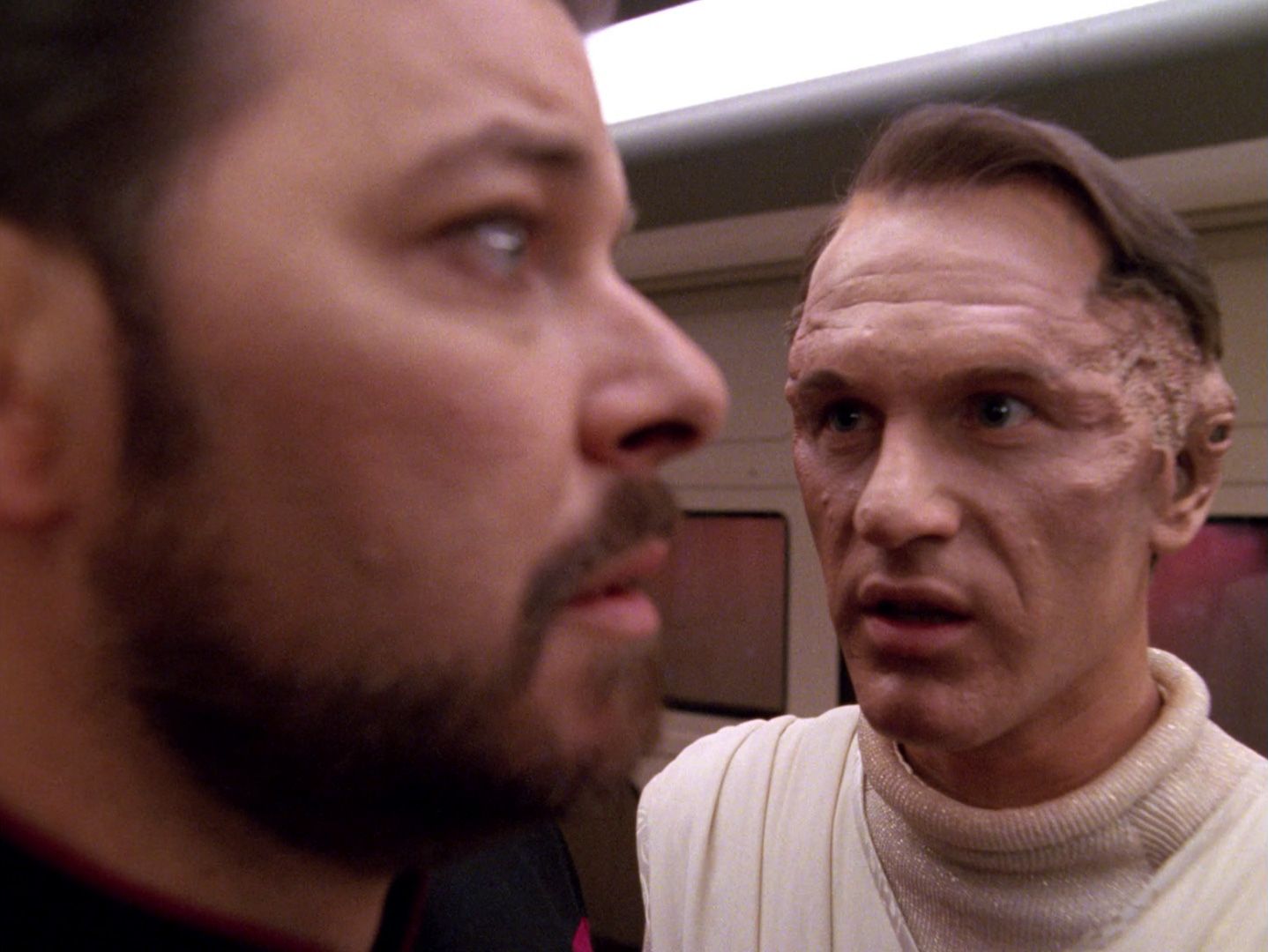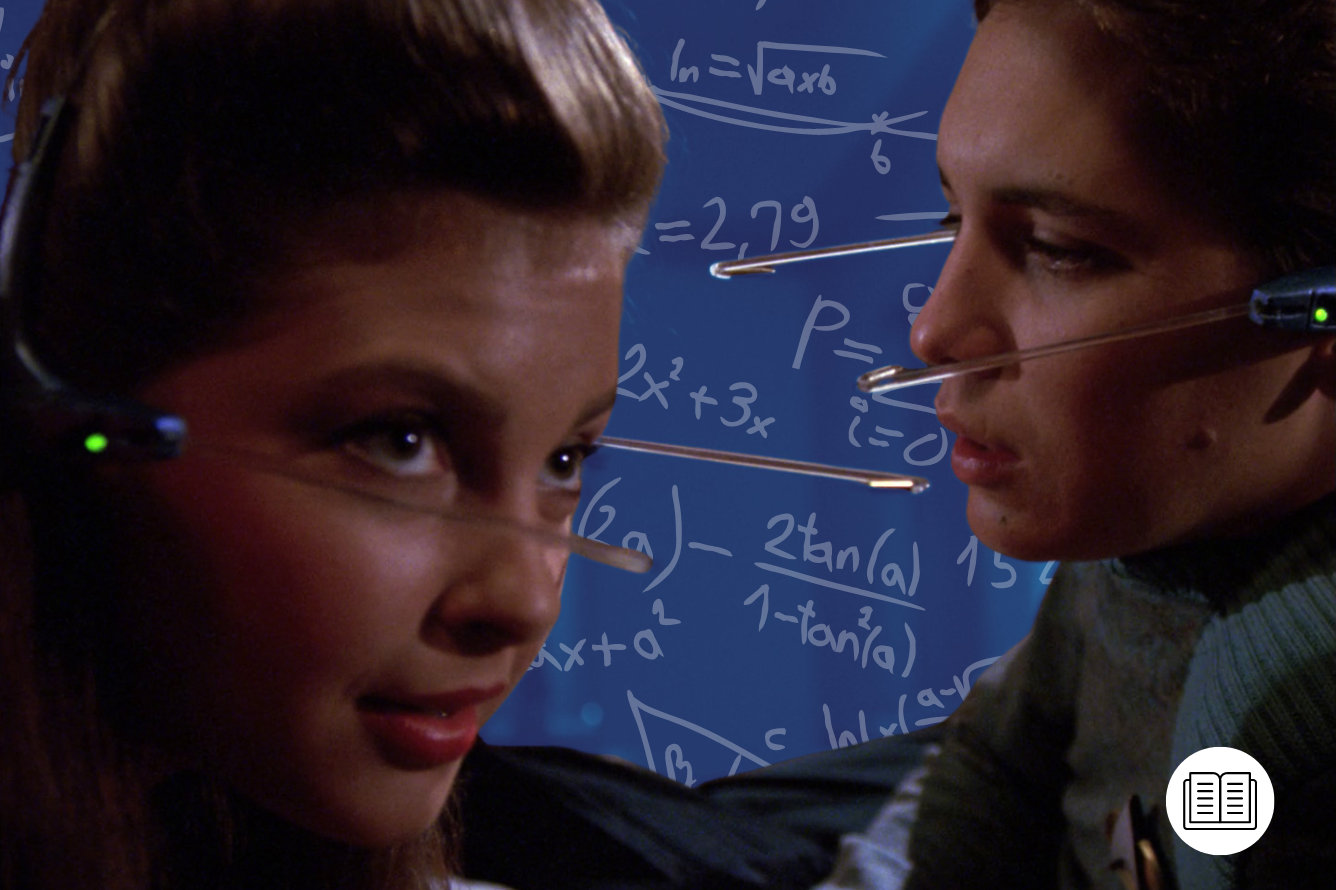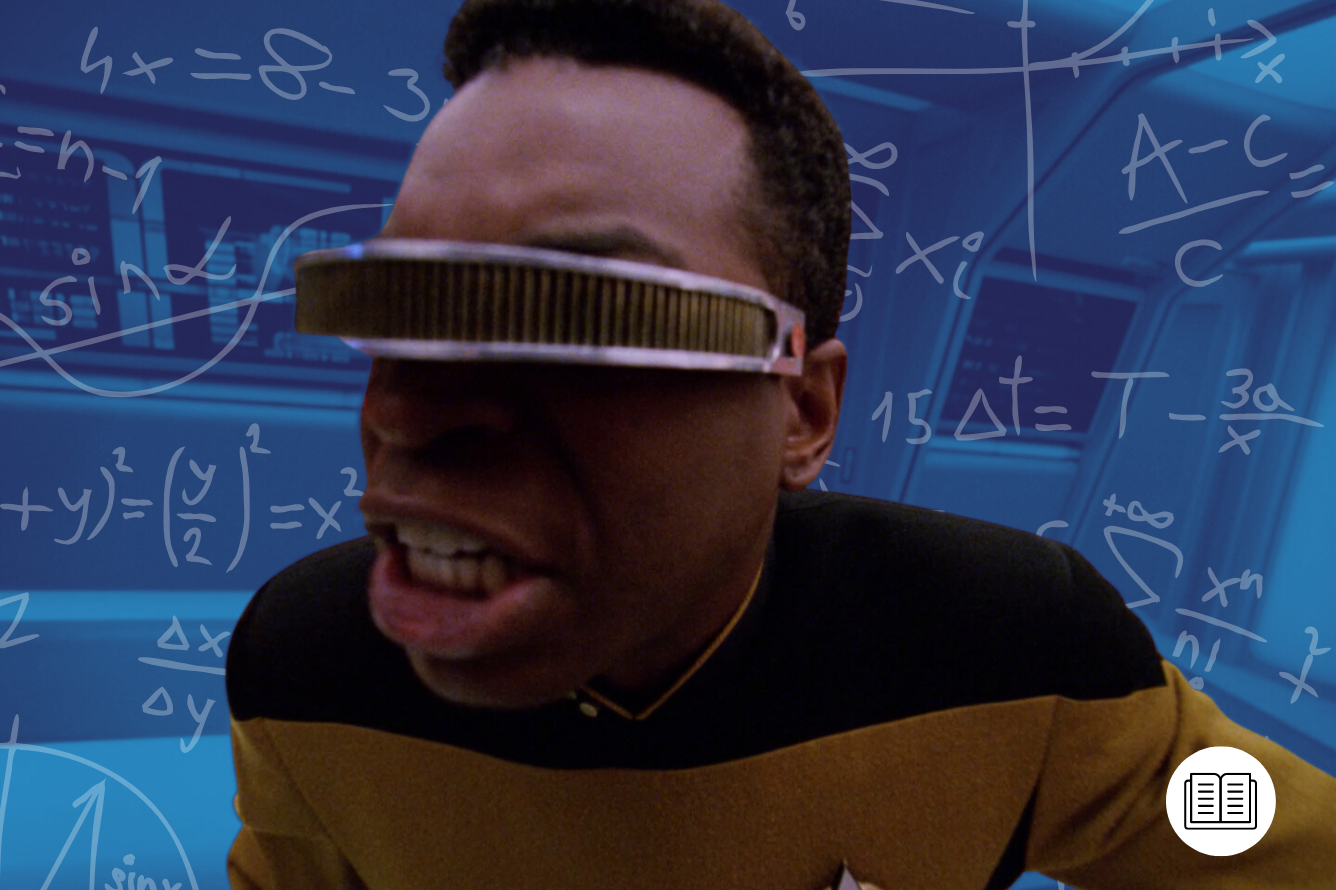We are all made of memories. The things we remember about our past significantly shape our identity and sense of self in the present. But our memories can be vulnerable to external influence. If anyone had the means to manipulate them, they’d hold immense power over our thoughts and behaviors.
In the Star Trek: The Next Generation episode ‘Violations’ (S5, Ep12) we meet a family with memory-altering abilities. Captain Jean-Luc Picard (Patrick Stewart) describes the Ullians as “telepathic historians”, and they mostly use their powers for good, helping willing crew members reach back through time to retrieve long-forgotten memories. But the youngest of the family, Jev (Ben Lemon), inflicts unpleasant memories on other people without their consent.
This episode has little physical violence, but the psychic violence is perhaps even more horrifying. Jev not only forces his victims to relive some of their most painful memories but manipulates them to be even more disturbing before inserting himself into them – a kind of psychic abuse that his father, Tarmin, later calls “a form of rape.”

False Memories in Reality
Thankfully, no Ullians are due a trip to Earth anytime soon, and the idea that someone could read our memories and then manipulate them just by being in our presence is, luckily, the stuff of science fiction. But the nature and creation of false memories have captured the attention of scientists and researchers for decades.
A false memory is a recollection of an event or experience that's either entirely made up or distorted. False memories are sometimes normal and even beneficial. Our brains are constantly updating and revising our memories, integrating new information, and discarding old information that's no longer relevant, which can sometimes introduce errors. Our imaginations also play a role in shaping our memories, filling in gaps or embellishing details, especially when we think back to experiences in our childhood. Memories that are influenced by external sources are more concerning.
Elizabeth Loftus is a psychologist, researcher, and Distinguished Professor at the University of California, Irvine, who specializes in false memory research. We asked her how false memories are created and under what circumstances they can take root in our minds.
“In my research, we plant false memories by exposing people to misinformation about an event they previously saw,” Loftus tells The Companion. “We can do this by asking leading questions or mentioning objects that did not exist.”
One good yet simple example comes from a study Loftus conducted back in the 70s that aimed to show how our memories can be affected by leading questions. Researchers showed participants several clips of traffic accidents and they were then asked to estimate the speed of the cars involved. However, the verbs used to describe the accident were changed, so the question looked something like: “Can you guess the speed of the cars when they smashed?” and “smashed” was replaced with “collided”, “bumped”, “hit” and “contacted”. The results showed that the estimated speed was influenced by the verb that was chosen. As you might expect, participants who were given the word “smashed” reported the highest speed estimate, and those who heard “contacted” reported the lowest speed. These results suggest that if we intentionally choose language that gives an impression of how fast the car was going, we can alter our perception of the event.
However, that example tweaks a memory that the participants already had, seeing the clip of the accident. In other studies, memories have been completely fabricated. For example, in the 90s Loftus also carried out an experiment now famously known as the ‘Lost in a Shopping Mall’ study. Participants were told a false story over a few weeks about how they were lost in a shopping mall as a child, and their families participated in adding factual accuracy, like what the locals looked like. Even though these events never actually happened, more than 25 percent of people participating in the study reported a clear memory of the fictional mall incident weeks later.

Other psychologists have carried out research since that shows the same effect with similar rates of false memory creation. So, whether you agree with the murky ethics of studies like these or not, they suggest that real memories can be distorted and false ones can be planted.

The Dangers of False Memory
There are plenty of examples of false memory creation out in the world, too. “People pick up misinformation when they talk with other witnesses, when they are interrogated by biased interviewers, or when they are exposed to misinformation in the media,” Loftus says.
The implications here are huge. False memories can not only affect us and our relationships with others but impact the criminal justice system, too, influencing the outcome of court cases.

Over the years, there have been several examples when therapists or law enforcement officers questioning witnesses have tried to access forgotten memories or repressed memories – memories that are the result of trauma. In doing so, they either inadvertently, or possibly even intentionally, created false ones.
For example, in 1990 George Franklin was convicted of the murder of his daughter’s friend 20 years before. This conviction was based on his daughter Eileen’s recovered memories.
Franklin spent six years in prison when problems were discovered with Eileen’s testimony. It transpired that she had been hypnotized before she testified, and during that process, a false memory had been created.
There’s also the more bizarre case of Paul Ingram, a story that involves several examples of false memories. Ingram was arrested in 1988 for allegedly sexually abusing his daughter as a child. Details of the abuse were also discovered through recovered memory therapy when she had become an adult. Ingram initially denied the claims, but over months of questioning, pressure, and sleep deprivation, he confessed.

According to his daughter, Ericka, the abuse involved hundreds of satanic rituals, the sacrifice of babies, and even Ericka’s forced abortion. The case went forward despite inconsistencies and no evidence beyond Ericka’s claims and Ingram’s admission. Renowned memory researcher Dr. Richard Ofshe was brought in to help and made up another story to do with the case, which Ingram also claimed was true – another false memory.

How to Guard Against False Memory
Cases like these make the issue of repressed memories controversial and confusing. Because although they show us that recollections of events and experiences can be manipulated, many psychologists and researchers argue that some people do forget extreme trauma, and sensory triggers can cause long-forgotten memories from the past to surface. Suggesting that all repressed memories from the distant past may be false is damaging for the actual victims of abuse and trauma and could be used as a line of defense to discredit their testimony.
The problem is there’s no surefire way of discerning a real memory from a false or distorted one, at least not yet. Researchers have been looking at clues in brain scans that may be more conclusive, which is promising but would need to be rolled out more widely.
As scientists and researchers work to develop robust methods for separating fact from fiction, should we be safeguarding ourselves against misinformation in our day-to-day lives? I don’t think we need to live in fear of the information around us, questioning every word we read and worrying about its memory-altering potential. But it was interesting to hear Loftus say that warning people before they encounter misinformation can reduce the likelihood of false memory creation – reading this and being aware of how malleable our memories are might be helpful in and of itself. However, we could all do with pausing more often and adopting a more mindful approach to the vast amounts of information we consume every day.
The cost of your membership has allowed us to mentor new writers and allowed us to reflect the diversity of voices within fandom. None of this is possible without you. Thank you. 🙂











